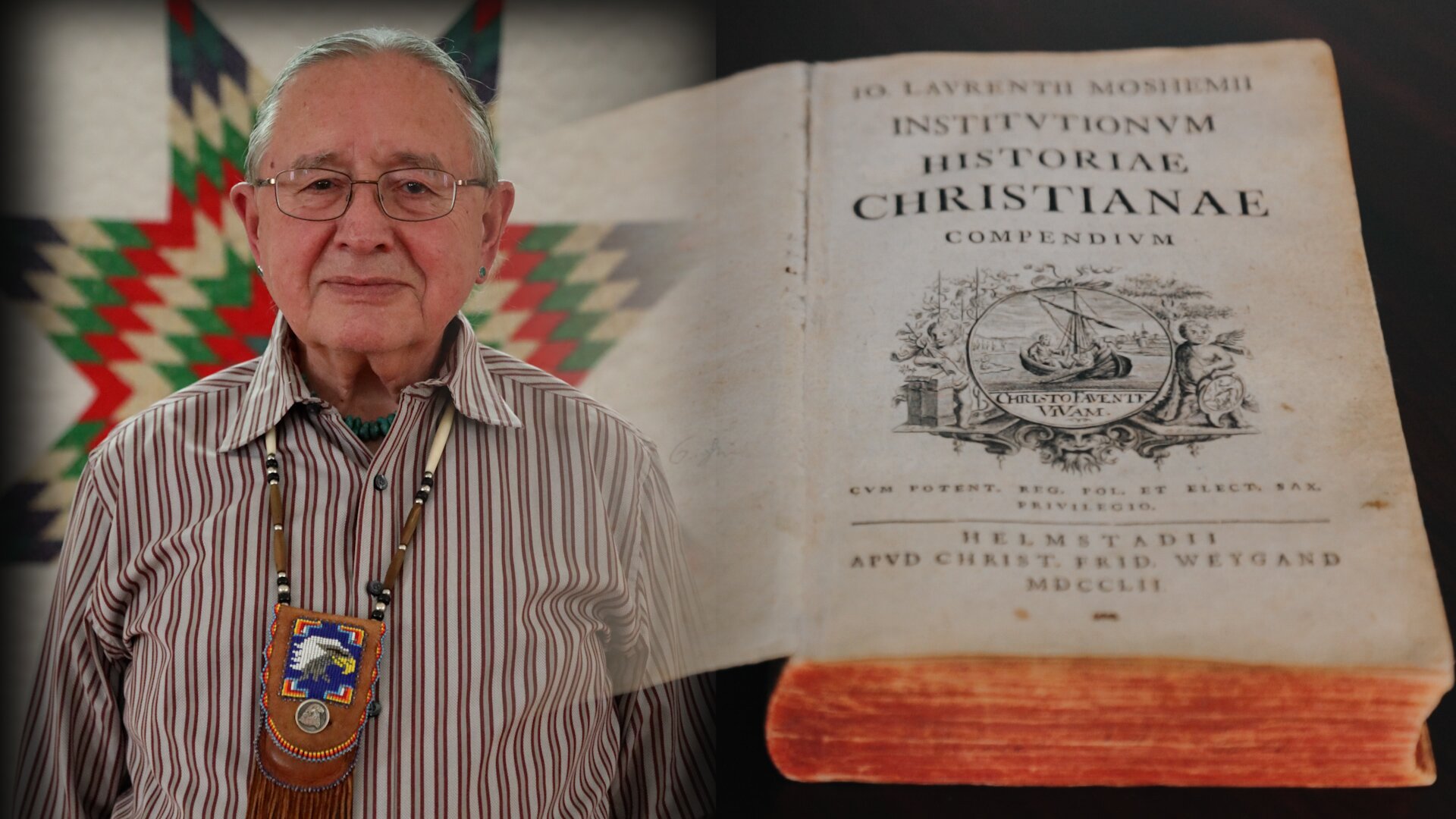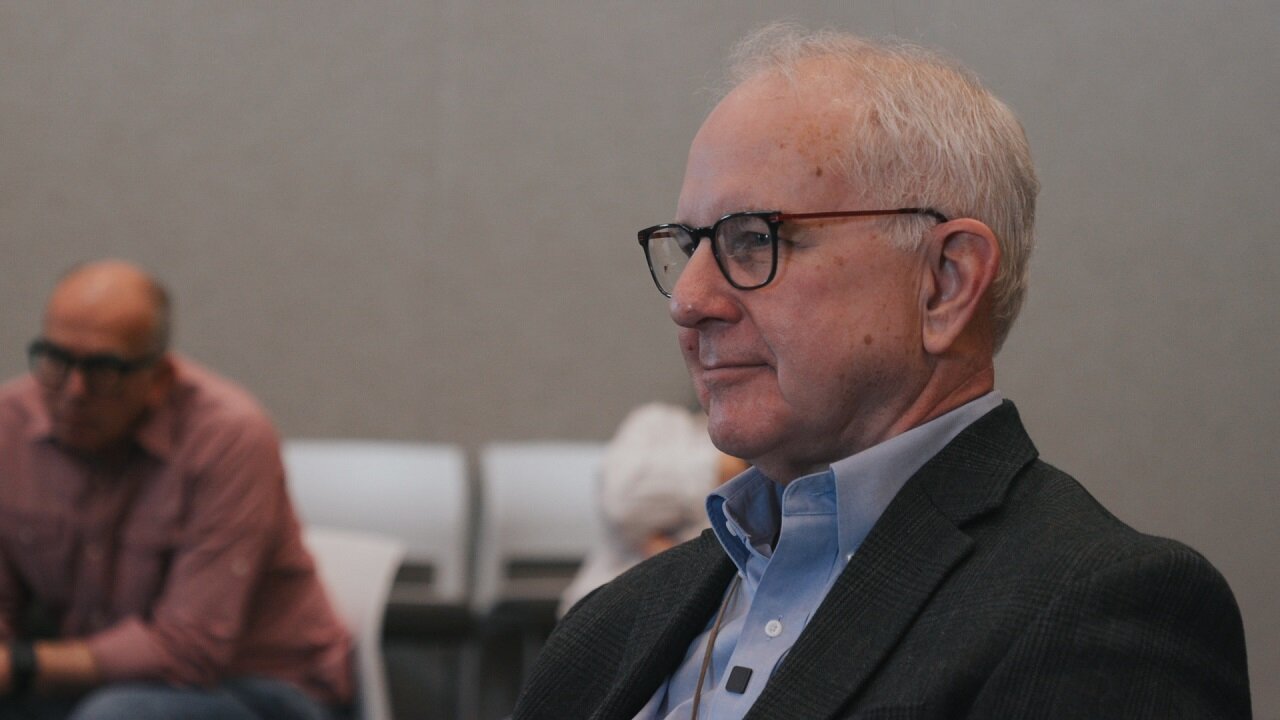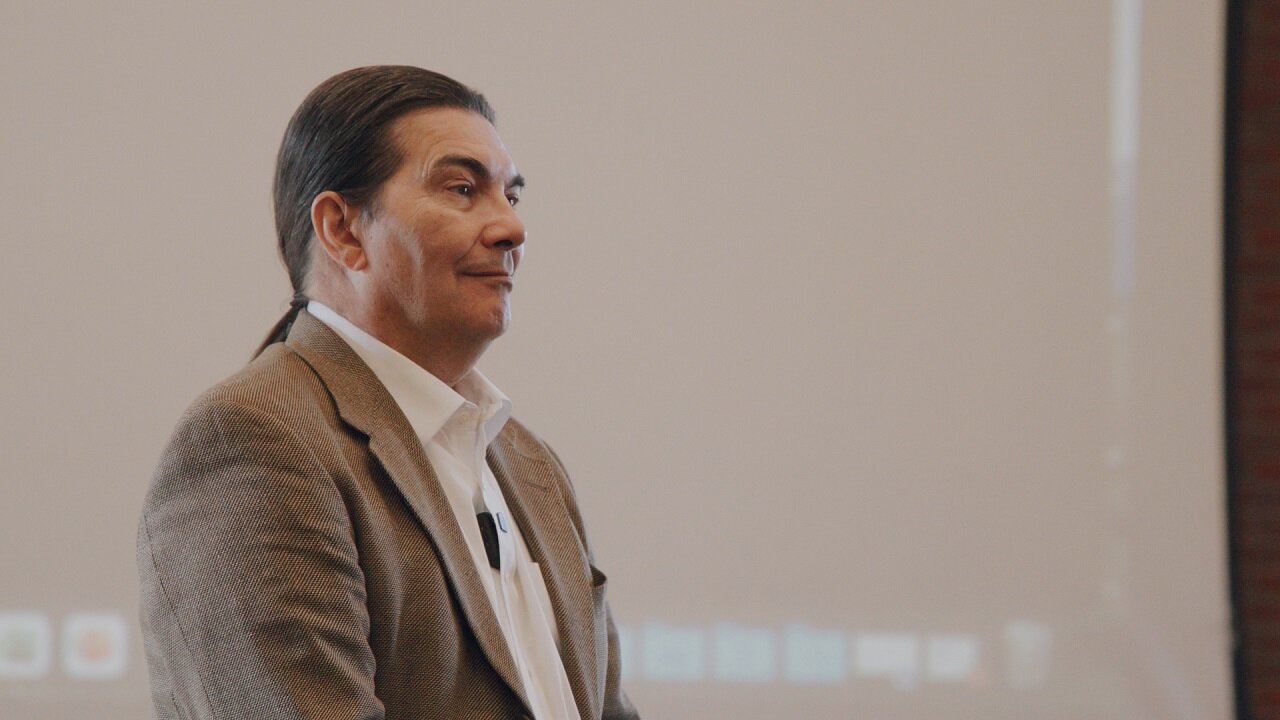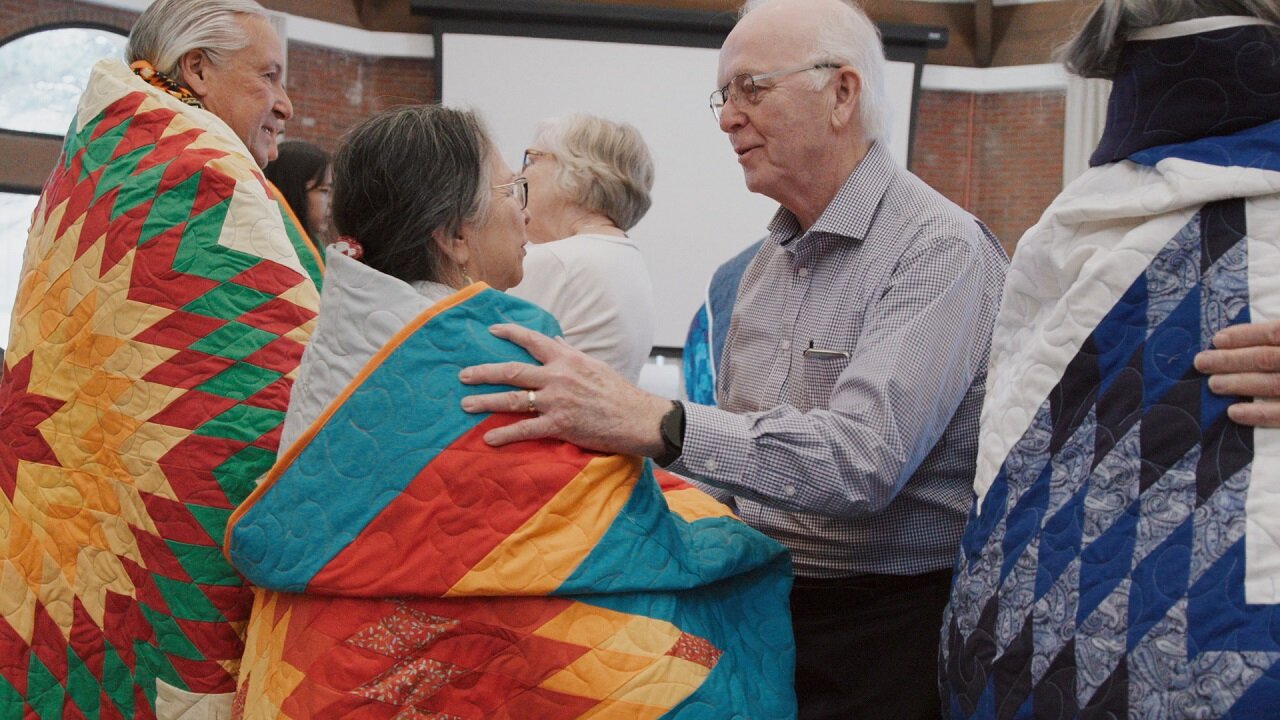The Next Chapter: The power of listening and relationship building

DENVER — Smiles, hugs and handshakes ended a recent meeting between Iliff School of Theology representatives and Lenape Nation elders — a stark contrast to the preceding decades of dark past between the two groups. For 80 years, the school had proudly displayed a book with a cover made from the tanned skin of a murdered Lenape man — then tried to cover up its mistake. Now Iliff representatives want to correct the school's course.
“I really had trepidation that this was nothing more than a ritualistic dog and pony show, so to speak,” explained Connie Falleaf, a Lenape Nation elder during the April 18 meeting. “I honestly had trouble believing [Iliff leaders] were sincere … [but] they really mean what they say,” she told Rocky Mountain PBS.
In 1779, a Euro-Christian colonialist murdered two Lenape Nation men who he considered were trespassing on his land. The flayed, tanned skin of one of the victims became the cover of a book of Christian history, originally published in 1752. Later it was given to a Methodist minister who then moved to Colorado and gifted the book to Iliff School of Theology in 1893.

George "Tink" Tinker has spent years researching the history of the book that was gifted to the Iliff School of Theology with the cover made from the skin of a murdered Lenape man.
"It's deeply ironic that they would cover that book of Christian history with human skin taken from a murder victim … an Indian,” said George “Tink” Tinker, an emeritus professor at Iliff and citizen of the Osage Nation who has spent years writing and researching the book's history.
Student protests prompted the school to take the book down in 1974, remove its cover and release the human remains to the American Indian Movement. In order to hide the controversy from public, everyone involved was instructed to sign a non-disclosure agreement.
“Christians have two words for it that we don’t have in any Indian language. It was evil, and it was sinful,” said Tinker about the forced non-disclosure agreement.
For nearly 40 years following the removal of the book from display, Iliff officials kept it locked in a safe, along with newspaper clippings, letters, and other materials.
The school's dark secret was finally addressed when Tom Wolfe became president of Iliff in 2013. Wolfe said he was presented with a file marked “confidential” that included the content of the safe along with a small card describing its cover.
“Just the idea of a book covered with the skin of a Native American person was profoundly disturbing,” Wolfe said. “[It's] not just one institution's lack of understanding, but it represents to me the whole nature of Christian domination that displaced and murdered millions of Native people.”
Wolfe asked Tinker to help find a way to acknowledge the past — and a path forward.

Current Iliff School of Theology president Tom Wolfe has lead the school's efforts to atone for its part in accepting and displaying this book.
“[I’m] utterly convinced the differentiating factor of dealing with the kind of history that we're dealing with here … is enhanced by both doing it publicly and doing it in context of the relationship with the people who have been most impacted by this historically,” explained Wolfe.
The effort to bring this history to light started a few years ago. Wolfe said the school held listening sessions, which eventually led Iliff to invite a delegation of Lenape elders to Denver in 2022 to discuss what should be done.
“Our big question is, what do we do with the book?” Wolfe said ahead of the first meeting with the Lenape delegation. “And the understanding was, we are preparing ourselves to be guided.”
After three days of meetings and discussions, the elders presented a list of the recommendations for Iliff:
- Commit to a permanent relationship with Lenape elders
- Create an endowed professorship with a job description written by Lenape elders
- Add required curriculum for all Iliff students to understand the Papal Bulls and the Doctrine of Discovery and Domination
- Create a memorial and/or traveling display featuring passages of the book read by Iliff students
- Create an interpretive center to educate Indians and non-Indians on the truths of American history in relationship to Indigenous nations
- At such time as it is requested by the Lenape, the Elders will take possession of the book
In the year since Lenape elders presented their statement of guidance, Iliff leaders have given various updates and held virtual meetings with the Lenape elders to address each of the action items. But it was important for both parties to meet again in person.
“You can get some things done on Zoom, but you lack that personal connection that creates the richness and, to me, helps in the commitment of what we're doing when we're working side by side and not on the Internet,” said Curtis Zunigha, a Lenape Nation Chief and co-founder of the Lenape Center, an arts and culture organization.
The two groups gathered again in Denver in April to talk about the progress made on the recommendations and to strengthen their relationship.
“A year ago, it was a little more skeptical and a little more getting to know each other,” said Gregory Miller, a Lenape elder, about his feelings going into these meetings. “I think this year it's cautious, optimistic … but much more of building a trusting relationship.”
The elders and the school say they’ve worked on a curriculum for a class that would be required for all Iliff students. In the meantime, Loring Abeyta, a historian and adjunct professor, has started teaching a class at Iliff about the book.
They have also discussed options for an outdoor memorial, including using stone or other materials from West Virginia where the Lenape man was murdered to honor his homeland.

Curtis Zunigha is a Lenape Nation chief and has helped lead discussions from the Lenape elders on guiding Iliff through this process.
“A memorial tells his story, an interpretive center tells our story,” Zunigha said.
A team at Iliff has started work on the interpretive center, which is centered around education. It will be a space where Indians and non-Indians can learn about the book’s history and how it applies to the wider history of Euro-Christian domination in America. The Iliff team identified a space in the library for the center and took suggestions from the Lenape delegation during their April 18 visit.
Falleaf expressed appreciation for the work Iliff had done but was disappointed by the size of the space for the interpretive center.
“The Lenape room needs to be comfortable for our people and for other people like us to pray and to learn and to think about our own histories, family histories, the national histories of each of our people. We need space for that,” Falleaf explained.
With each step, Wolfe said the most important part is the collaboration and the listening that is taking place.
“To have them walking alongside of us with all of this and for us to defer to them, but at the same time authentically contributing what we think might be the way forward and then to process that with them is critically important,” Wolfe said with the goal in mind to transform learning and the institution itself.
Transformation is why each one of the recommendations exists, including the one to establish a permanent relationship with Lenape elders, something Zunigha said the board of trustees incorporated into their bylaws.
“I expect that that commitment to an ongoing relationship with the Lenape will continue indefinitely, and it will outlive any current board president, university president or Lenape elder that is assembled today,” Zunigha explained.
Wolfe, who has been an integral part of this new path for Iliff, is retiring on June 30, but he is confident the progress will continue after he leaves.
“There's an array of places that need some fresh thinking about how you deal with histories that are — to say it lightly — uncomfortable or ugly or injust [sic],” Wolfe explained. “I will step away from Iliff and leave it to new leadership.”
Still his dream is to have this change grow through the Iliff School of Theology and its board, faculty and students. Looking 100 years in the future, Wolfe hopes Iliff becomes “an institution that fully recognizes the worldview of Native Americans, that has the courage to structure itself in alignment with that worldview.”

George "Tink" Tinker gifted these quilts to Lenape Nation elders, Iliff president Tom Wolfe and others at the 2023 meetings.
“This world has become more and more based on acts of individualism. And we measure success on that,” said Miller. “I think caring for one another in a sense of community is going to bring us a much brighter future, and we need that at this time.”
For many of the elders, their relationship with Iliff leadership demonstrates a first step towards that worldview and brings relief that they are finally being heard.
“I'm just so grateful and yet still in disbelief that somebody like Iliff, the staff, the faculty, the administration … sincerely wants to listen to us. And I am honored,” said Falleaf.
While the elders' recommendations have brought progress over the past year, both groups recognize there is still work ahead. For now, the book will remain at the Iliff School of Theology. The two groups are tentatively scheduled to meet again in 2024.
Amanda Horvath is the managing producer at Rocky Mountain PBS. You can reach her at amandahorvath@rmpbs.org
Alexis Kikoen is the executive producer at Rocky Mountain PBS. You can reach her at alexiskikoen@rmpbs.org.
Jeremy Moore is the content co-director at Rocky Mountain PBS. You can reach him at jeremymoore@rmpbs.org.